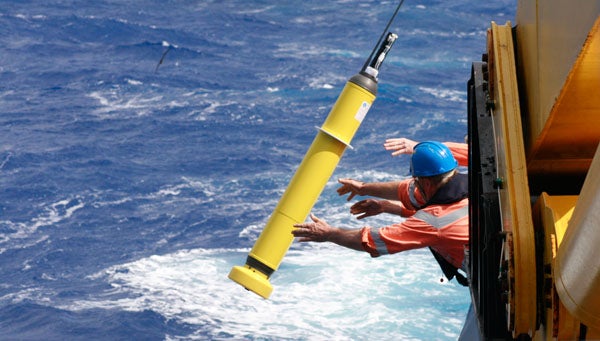New estimate of ocean heat finds more warming
Recent observations lead to a better understanding of the past
Mar 10, 2017 - by Staff
Mar 10, 2017 - by Staff
March 10, 2017 | The oceans may be storing 13 percent more heat than previously estimated, according to a new study co-authored by scientists at the National Center for Atmospheric Research (NCAR).
The finding, published in the journal Science Advances, is based on a new analysis of how ocean temperatures have changed since 1960. The research team, led by Lijing Cheng of the Chinese Academy of Sciences, compared their results to estimates published in the Fifth Assessment Report of the Intergovernmental Panel on Climate Change in 2013.
"In other words, the planet is warming quite a lot more than we thought," said NCAR scientist Kevin Trenberth, a study co-author.
The vast majority of excess heat trapped on Earth by greenhouse gas emissions — about 90 percent — is stored in the oceans, but measuring how the heat content of the oceans has changed over time has been a challenge due to sparse observations.
 The deployment of an Argo float off a research vessel. Data collected from Argo floats were used to validate a new estimate of ocean heat content. (Image courtesy of the Australian Commonwealth Scientific and Industrial Research Organization.)
The deployment of an Argo float off a research vessel. Data collected from Argo floats were used to validate a new estimate of ocean heat content. (Image courtesy of the Australian Commonwealth Scientific and Industrial Research Organization.)
Historically, the temperature of ocean waters was measured by a variety of ships, but this limited observations to areas where ships traveled. In more recent decades, measurements of ocean heat have increased, thanks to new observational techniques. In 2000, scientists began deploying a network of thousands of floats called Argo to profile conditions in the top layer of the ocean extending down 2,000 meters (6,562 feet). Argo achieved near global coverage in 2005, though some remote regions are still not sampled.
To fill the large gaps in the historical ocean temperature record, the research team used a combination of statistical techniques and model output to determine how useful a single observation can be for inferring information about the surrounding area, as well as how the temperatures in different parts of the world's oceans relate to one another. They found that, in most regions, a single ocean observation could provide valuable information about conditions as far as 2,000 kilometers (1,243 miles) away.
To check if they were correct, they used Argo observations. At first, they chose data from only a small number of floats in the network to mimic the scarcity of observations that would have been available in the mid-20th century. Then they used their new technique to create an entire ocean temperature map based on those few observations. When they checked their map against the full complement of Argo observations, they found that their reconstruction tracked closely with reality.
"The results were remarkable," Trenberth said. "They give us much more confidence about what the ocean heat content was, stretching back to the late 1950s."
The results allowed the team to estimate the total warming between 1960 and 2005 to be 337 zettajoules (a measure of energy). They also found that changes were small until 1980, when the amount of heat stored in the oceans began to steadily increase. Since 1990, significant amounts of heat have begun to seep deeper into the ocean layers.
NCAR scientist and co-author John Fasullo said the study also highlights the impact of improved observations and models, which are giving scientists important insights into what the world once looked like.
"Science not only looks toward the future, but is also continually trying to make sense of the past," he said. "This work is an example of how advances in technology have enabled an improved understanding of past changes in the ocean, where variability has always been a bit of an enigma due to its vastness and depth. The insights associated with this work change not only our understanding of past climate but also how future changes might unfold."
The other co-authors are Tim Boyer, of the National Oceanic and Atmospheric Administration; John Abraham, of the University of St. Thomas; and Jiang Zhu, of the Chinese Academy of Sciences.
Title: Improved estimates of ocean heat content from 1960 to 2015
Authors: Lijing Cheng, Kevin Trenberth, John Fasullo, Tim Boyer, John Abraham, and Jiang Zhu
Journal: Science Advances, DOI: 10.1126/sciadv.1601545
Writer/contact
Laura Snider, Senior Science Writer and Public Information Officer
Funders
Chinese Academy of Sciences
National Science Foundation of China
U.S. Department of Energy
National Science Foundation
NASA
Collaborators
Chinese Academy of Sciences
National Oceanic and Atmospheric Administration
University of St. Thomas